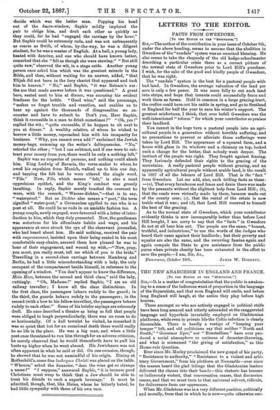LETTERS TO THE EDITOR.
FACTS FROM GWEEDORE.
[To TER EDITOR Or TIM 4.8PROTAT01.1 8114—The author of the contribution in your issue of October 8th, under the above beading, seems to assume that the abolition in Gweedore of the "nindale" system was an unmixed blessing. He also seems to take the rhapsody of the old hedge-schoolmaster describing a particular crisis there as a correct picture of the normal state of Gweedore prior to Lord Hill's purchase. I wish, for the sake of the good and kindly people of Gweedore, that he was right.
The "rundale " system is the best for a pastoral people with had land. In Gweedore, the average valuation of the land per acre is only a few pence. It was mere folly to cut such land into strips, and hope that tenants could successfully fence and work them as farms. Held in common in a large grazing-tract, the crofter could turn out his cattle in spring, and go to Scotland or England for half the year to earn his winter's support. The greatest misfortune, I think, that ever befell Gweedore was the well-intentioned " reform " for which your contributor so praises their landlord.
You cannot in the bogs tarn a pastoral people into an agri- cultural people in a generation without horrible suffering. and no precautions to prevent or alleviate those sufferings were taken by Lord Hill. The appearance of a equared farm, and a house with glass in its windows and a chimney on top, looked such a change for the better, that nobody went deeper. The instinct of the people was right. They fought against *fencing. They furiously defended their rights to the grazing of the mountains. A really pastoral people without grazing, and an apparently agricultural people without arable land, is the result in 1887 of all the labours of Lord Hill. That is the " fact " from Gweedore. Let me add, also, such trifling facts as these: —(a), That every farmhouse and fence and drain there was made by the peasants without the slightest help from Lord Hill ; (6), that the roads were virtually made by them, because made out of the county eese ; (c), that the rental of the estate is now treble what it was; and (d), that Lord Hill reserved to himself the best of the grazing.
As to the normal state of Gweedore, which your contributor evidently thinks is now incomparably better than before Lord Hill bought, I am sorry to say that the "facts " in Gweedore do not at all bear him out. The people are the same, "honest, truthful, and industrious," to use the words of the Judges who beard their cases against their landlords ; but their poverty and squalor are also the same, and the recurring famine again and again compels the State to give assistance from the public purse when private charity has been exhausted in the effort to save the people.—I am, Sir, &c.,






































 Previous page
Previous page